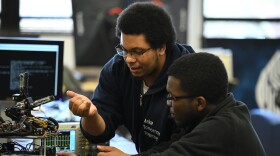Wake Technical Community College is the only community college in the state with a program to help foster kids transition to college.
The program, Fostering Bright Futures, guides the students through graduation at Wake Tech and assists in transfers to bachelor’s degree programs.
Michelle Blackmon, coordinator of the program, said when most foster kids turn 18, they become independent, and most will choose to work instead of paying for college.
According to the program’s website: “Fewer than 10 percent of these young adults enroll in postsecondary education – and only two percent graduate.”
In order to entice students, the program offers numerous services to the students including financial support, career counseling and individual mentors.
“There are so many students out there in need,” Blackmon said. “And one thing you hear from the students is just having that support system, knowing they have that one person they can go to whenever they need assistance makes the world of difference.”
Fostering Bright Futures partners with several local companies and organizations to support the students. Lenovo, for example, provides laptops for the students. Blackmon said she’s also working to improve housing, which is a key issue facing youth aging out of foster care.
“They take that option to age out, whether it’s an opportunity to go live on their own, or they may end up in a homeless shelter or with maybe a family where they can find somewhere to lay their head,” Blackmon said.
There’s a 15-person limit to the program and there are 12 active students. One of them is 24-year-old Shana Hilliard. She’s in her second year and on a nursing track to earn her associate’s degree from Wake Tech next year and her bachelor’s from Winston-Salem State University in her fourth year.
Before she joined the program, Hilliard was a single mom struggling to get through school. But then she heard about the support system at Fostering Bright Futures and applied.
“Anything that you can think of, they're there for you,” Hilliard said. “And most of us being in foster care, we really don't have much contact with our biological families so that's what they are. They're our family.”







